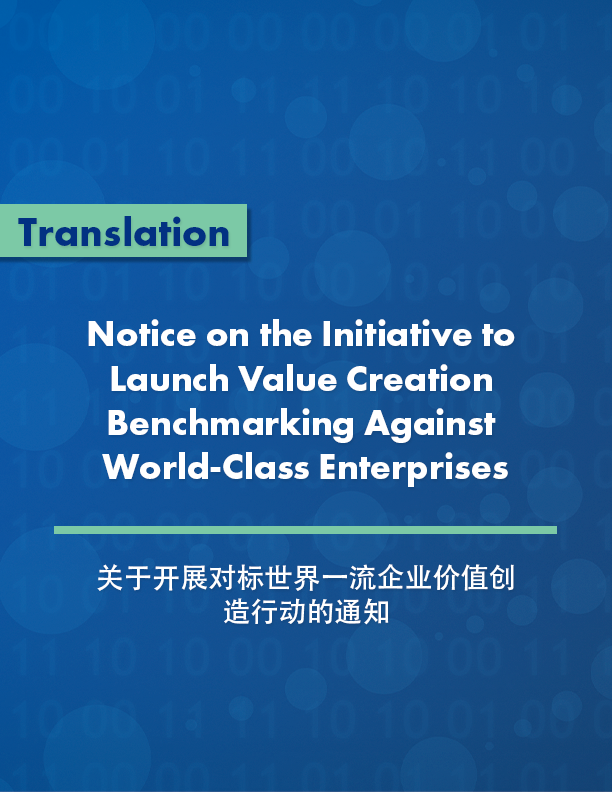The following document, issued in 2022 by the Chinese government ministry in charge of state-run enterprises (SOEs) and popularly known simply as “Document 79,” announces a campaign to improve SOEs’ “value creation.” The Wall Street Journal reported that this directive requires SOEs in strategic economic sectors to replace all of their foreign IT software by 2027, a drive known informally in China as “Delete A,” for “delete America.” The publicly available version of Document 79 translated below does not mention anything about removing foreign software, although it does emphasize the importance of SOEs improving their capacity for in-house innovation.
An archived version of the Chinese source text is available at: https://perma.cc/KP6C-5RCZ
Document of the State-owned Assets Supervision and Administration Commission of the State Council
(2022) No. 79
Notice on the Initiative to Launch Value Creation Benchmarking Against World-Class Enterprises
To central enterprises1 and the state-owned assets supervision and administration commissions of all provinces, autonomous regions, province-level municipalities, cities with independent planning status under the national economic and social development plan, and the Xinjiang Production and Construction Corps:
Value creation is an important part of achieving high-quality development by state-owned enterprises (SOEs) and an essential requirement for enterprises to raise their global competitiveness. In recent years, the scale and strength of SOEs have been increasing, laying a solid foundation for the construction of world-class enterprises, but the problems of weak value-creation ability and low quality and efficiency still exist, constraining the higher-quality and more sustainable development of enterprises. In the face of the current complex and grim external situation and challenges, SOEs must maximize their value creation ability, continuously improve the quality of products and services and enterprise efficiency and efficacy, and thereby effectively enhance their ability to compete, innovate, control, and influence, and their ability to withstand risks. In order to deeply implement General Secretary Xi Jinping’s important instructions on accelerating the construction of world-class enterprises, and put into practice the spirit of the 20th Party Congress and the deployment requirements of the Central Economic Work Conference, the State-owned Assets Supervision and Administration Commission of the State Council (SASAC) has decided to launch a value creation initiative in SOEs by benchmarking against world-class enterprises. Notice of the relevant matters is hereby given as follows:
Overall Requirements
Guiding ideology:
We must be guided by Xi Jinping Thought on Socialism with Chinese Characteristics for a New Era, be firmly rooted in the new stage of development (新发展阶段, completely, accurately, and comprehensively carry out the new concept of development (新发展理念), take improving the quality, effectiveness, and efficiency of development as the main thread, and take benchmarking against world-class enterprises as the starting point. We shall push SOEs to refine their value-creation systems, raise their value creation ability, and speed up the transformation from quantitative scale to qualitative effectiveness and efficiency, from focusing on short-term performance to focusing on long-term value, and from a single value perspective to an overall concept of value, so as to better fulfill their economic, political, and social responsibilities, and provide strong support for the accelerated construction of world-class enterprises.
To view the rest of this translation, download the pdf below.
Download Full Translation
Notice on the Initiative to Launch Value Creation Benchmarking Against World-Class Enterprises- Translator’s note: The term “central enterprises” (中央企业) refers to state-owned enterprises (SOEs) directly under the PRC Central People’s Government (aka the State Council) whose leaders are appointed by the State Council or the Chinese Communist Party (CCP) Central Committee, either directly or by the CCP Central Organization Department, the State-owned Assets Supervision and Administration Commission (SASAC), or another central party or government department.
